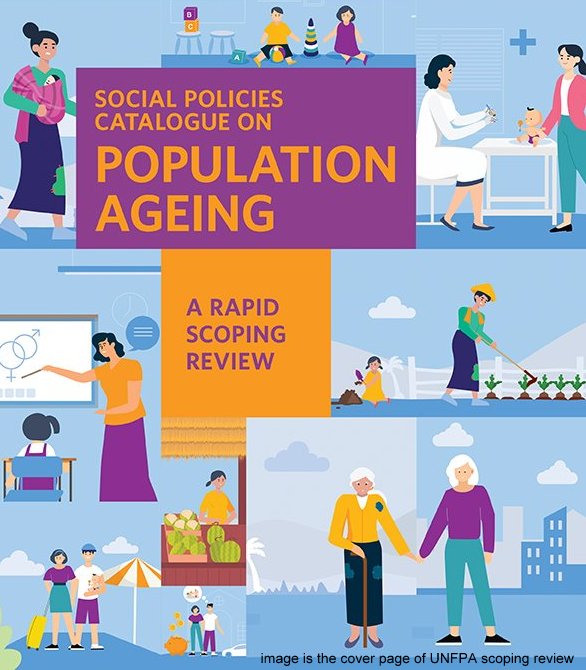
lifecycle approach can lead us to a world where people of all ages including the elderly live life fully, healthy and with rights and dignity
(Image by CNS) Details DMCA
The world celebrated International Day of Older Persons on 1st of October. Sri Lanka also celebrates its Children's Day on the same day. What a beautiful coincidence, even though perhaps purely by chance (and not by design). Indeed, this celebration of the young and old age alike is a symbolic representation of the lifecycle approach and intergenerational engagement that is crucial for addressing some of the challenges of population ageing or longevity.
While e-launching "The
social policies catalogue on population ageing: A rapid scoping review"
developed by United Nations Population Fund (UNFPA) Asia Pacific, its Director,
Bjorn Andersson, reiterated that the solutions to the challenges faced by the
ageing populations in the region must be grounded in a life-cycle and
inter-generational approach, with gender equality and social inclusion at its
core, and optimal sexual and reproductive health and reproductive rights for women
and girls as its key components.
Andersson said that there is no country in the Asia Pacific region that has a
single policy addressing all aspects of the dynamic population transition. Many
policies on population ageing do not include intergenerational engagement,
while others lack social inclusion components to enable full and meaningful
participation of older persons in society.
The social
policies catalogue on population ageing seeks to systemically identify and
collate available social policies on population ageing on a global scale.
Andersson hoped that the catalogue, which seeks to systematically identify and
collate available social policies on population ageing, will enable governments
to help strategise and strengthen policies that reflect the needs of older
persons and promote healthy ageing.
This would requires:
- strengthening of health systems to promote healthy life styles throughout the life course to reduce risks of NCDs and ensure equal access to sexual and reproductive health and rights SRHR;
- strengthening social policies, including social protection, so that all individuals can attain an education and decent work and have access to social safety nets like childcare and pension schemes; and
- eliminating all forms of discrimination against older persons through promotion of social inclusion, including intergenerational solidarity and age friendly environments to transform society positively towards ageing.
decadent gender roles are biggest bane for the older women
Illiteracy and society's clinging
to decadent gender specific roles is the biggest bane of the elderly women,
especially in countries of South and South-East Asia. Despite the reality that
COVID-19 pandemic has exposed the "fiction that unpaid care work isn't
work" (said Antonio Guterres, UN Secretary General) , women even if
educated, are expected to be engaged in unpaid work as carers of the family. In
patriarchal societies, like India, there is hardly any help coming from the
male members of the family, even in the so-called modern households. So their
participation in the workforce takes a backseat and they are economically
dependent on the menfolk. So they have no money of their own and hence no
personal security net or social protection in their old age. Moreover, as
biologically women tend to live longer than men, this longevity simply abets
their financial as well as health problems.
Professor Tengku Aizan Hamid of Malaysian Research Institute on Ageing
(MyAgeing) and Director of the Institute of Gerontology, Universiti Putra
Malaysia, said that as childcare is very expensive in Malaysia, even educated
women find it more economical to stay out of the workforce rather than put
their children in daycare. According to her there is a need to look at social
protection aspects in terms of lifecycle perspective of providing for women,
and stereotype gender roles should not override or determine their workforce
participation.
While speaking at an online session of 10th Asia Pacific Conference on
Reproductive and Sexual Health and Rights (APCRSHR10), Krishna Murari Gautam,
Chairperson of Ageing Nepal (Ageing Nepal was awarded the coveted UNESCO King
Sejong Literacy Prize last month), made a fervent plea for the lifecycle
approach to address and incorporate health, education, and training.
All these three components (of health, education and training) are an integral
part of every stage of human life. Maintaining a healthy lifestyle throughout
the lifecycle, starting from childhood is essential for healthy ageing and for
keeping many illnesses at bay. Education stands everyone in good stead - not
only in terms of making one more employment worthy, but also for expanding the
ability to think rationally and act without prejudice. Training and updating
oneself with the latest technology will not only reduce the generation gap, but
also help in social inclusion and improve the coping mechanisms of the senior
citizens. And yes, let us also give a thought to celebrating Children's Day and
the Day of the Older Persons together in a participatory manner.
1st of October 2020 was also the start of the "Decade of Healthy Ageing",
a World Health Organization (WHO) supported UN initiative to "bring
together governments, civil society, international agencies, professionals,
academia, the media, and the private sector for ten years of concerted,
catalytic and collaborative action to improve the lives of older people, their
families, and the communities in which they live."
(Note: You can view every article as one long page if you sign up as an Advocate Member, or higher).





